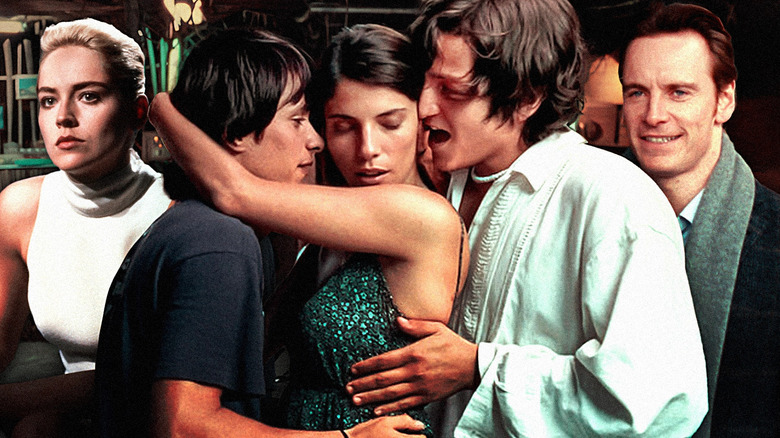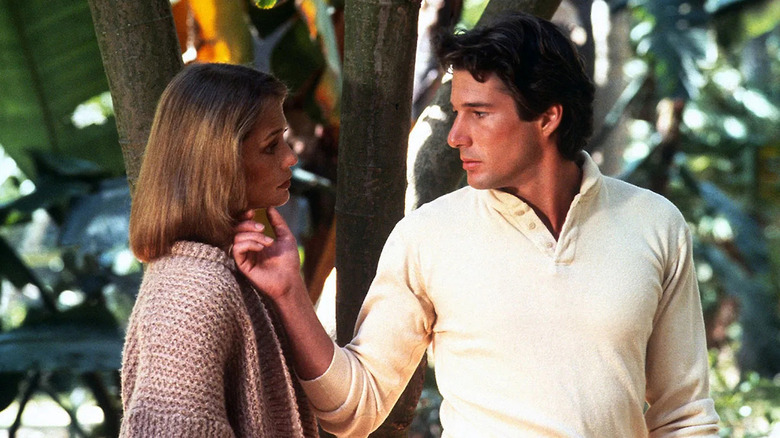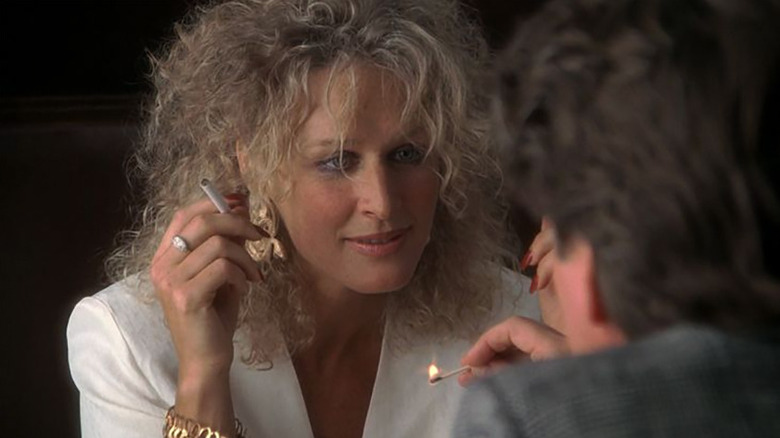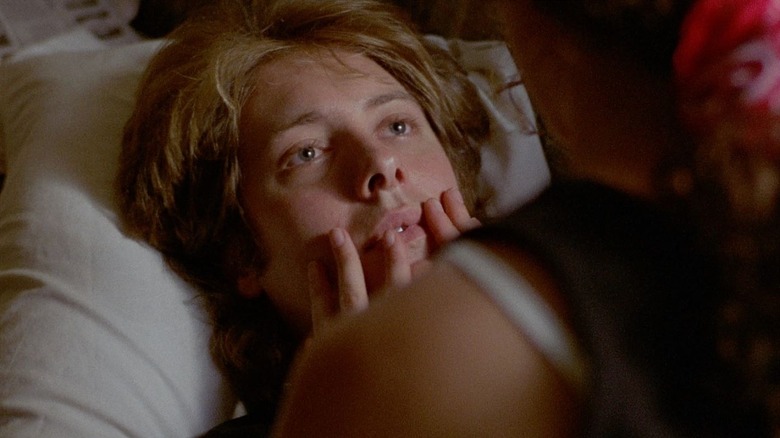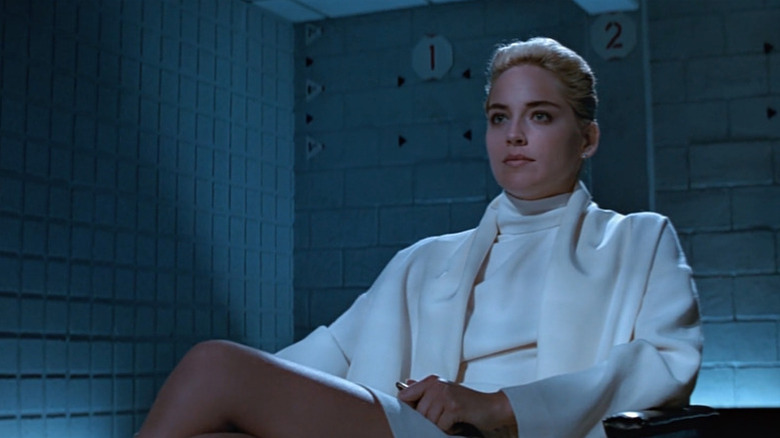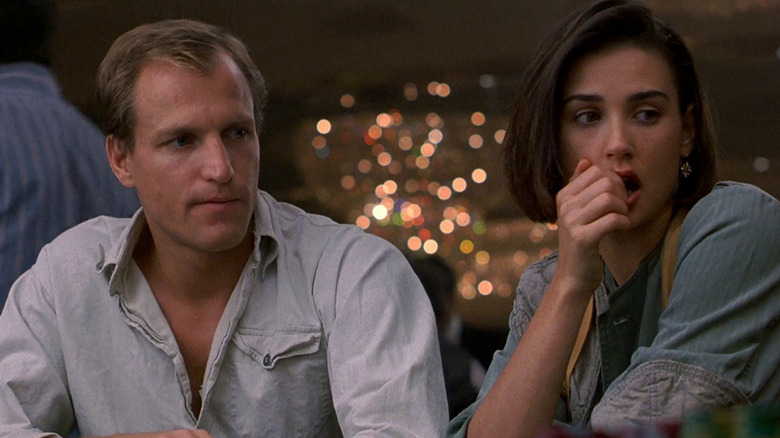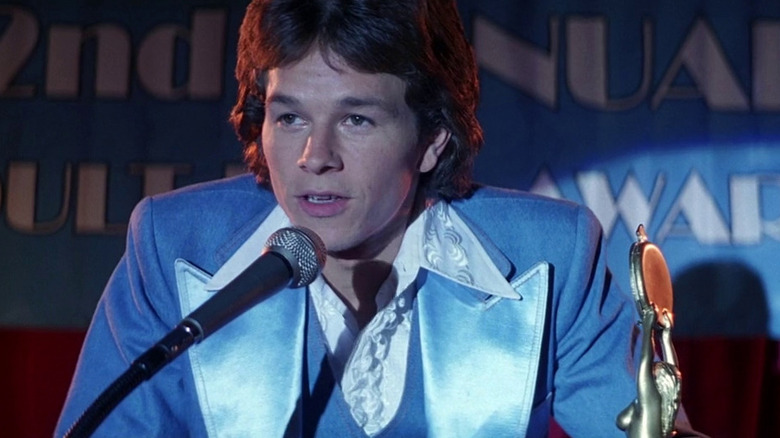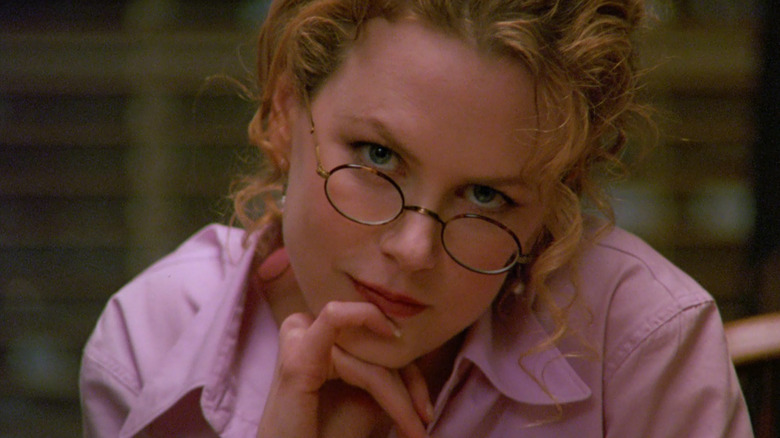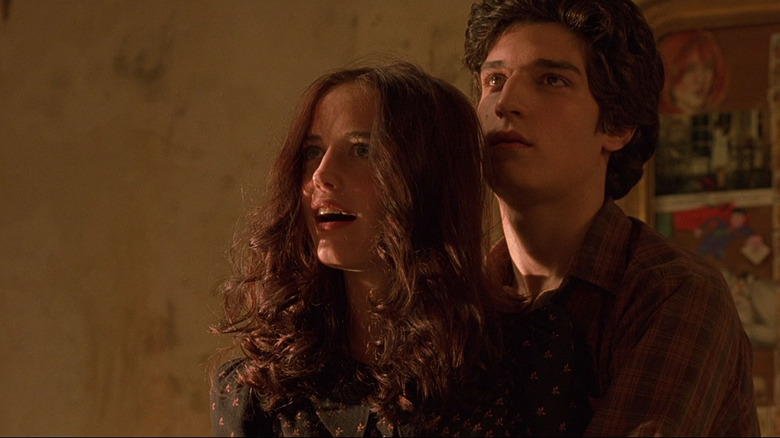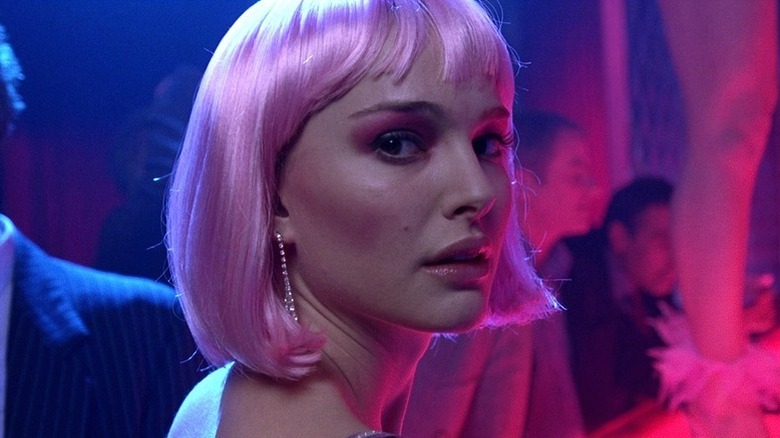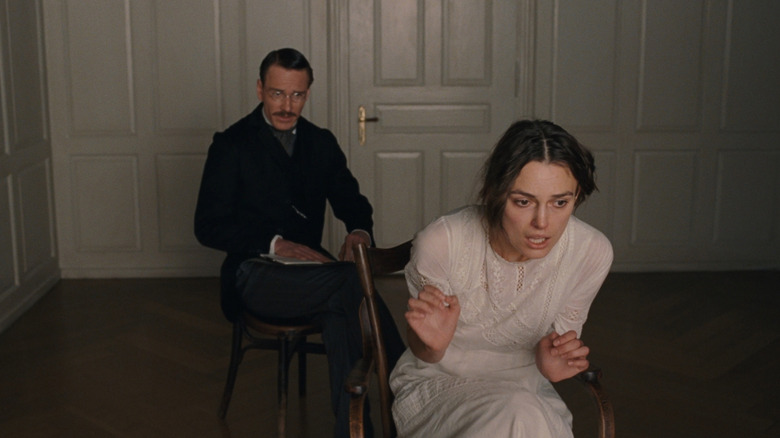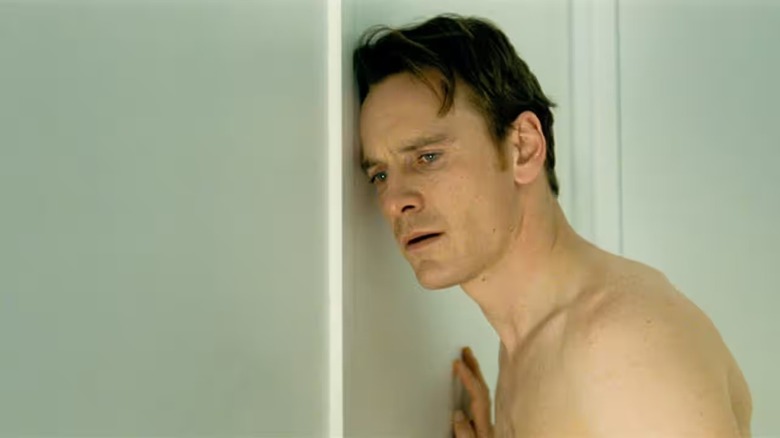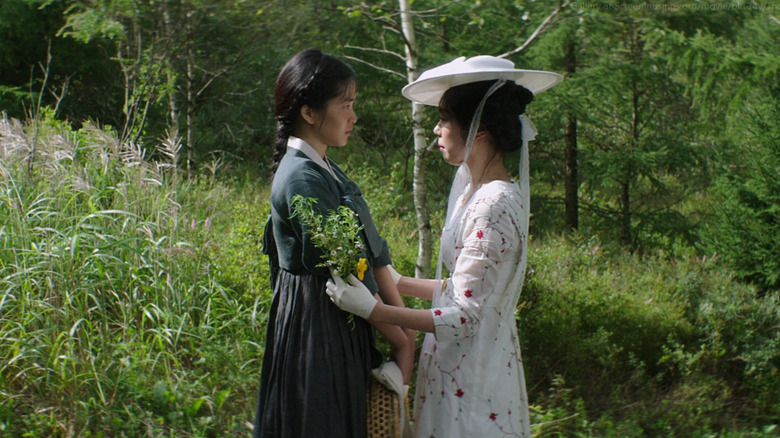15 Best Movies Like Fifty Shades Of Grey
A best-selling smash before being adapted into a trilogy of similarly successful movies, author E.L James' "Fifty Shades of Grey" is a strong reminder that sex sells. The novels and their cinematic adaptations explored a central romance that dealt heavily in eroticism and uninhibited sexual passion. The story occasionally broached on darker themes, bordering on the thriller genre, but maintained its key narrative focus on the sensuality between its lead characters. Fortunately, for those looking for similar steamy stories or dark explorations into sexuality, there are a number of acclaimed movies to follow up the "Fifty Shades of Grey" trilogy.
Whether it's the ultimate in cinematic bad romances or neo-noir thrillers that have a decidedly erotic tinge, plenty of movies provide unflinching on-screen sensuality. To be clear, this isn't just a collection of movies that would make your parents blush but rather well-crafted films that happen to be linked by frank sexual themes. That said, the movies included here are certainly not for the more prude, puritanical crowd uncomfortable in openly addressing human sexuality.
Here are the 15 best movies like "Fifty Shades of Grey."
American Gigolo
Filmmaker Paul Schrader has had a creative hand in some of the best thrillers in the '70s and '80s, including "Taxi Driver," "Rolling Thunder," and "Hardcore." One particularly sex-oriented highlight in Schrader's body of work is 1980's "American Gigolo," starring Richard Gere as Los Angeles sex worker Julian Kay. While on an assignment in Palm Springs, Julian is framed for murder, completely upending his well-maintained, materialistic life. Desperate to clear his name, Julian sets out to learn who set him up as he becomes a wanted man in the City of Angels.
Like many Schrader films, there is an omnipresent gloomy nihilism to "American Gigolo," even before Julian's world comes crashing down around him. All the meaningless sex with wealthy, lonely, and bored older women leaves Julian just a shallow shell of a man, more interested in his appearance than anything else. Being framed for murder should be a wake-up call for Julian, but Gere and Schrader beautifully play out the final confrontation as another impulsive and violent reveal. A stylish neo-noir thriller soaked in sex and overpriced suits, "American Gigolo" is among Schrader's best work as a director.
Fatal Attraction
Erotic thrillers were catapulted into award season fare with 1987's "Fatal Attraction," starring Michael Douglas and Glenn Close. Douglas plays Dan Gallagher, a Manhattan attorney, who begins an affair with publishing editor Alex Forrest (Close) while his family is out of town. When Forrest becomes obsessively attached to Gallagher, despite his attempts to break off their illicit relationship, her behavior quickly grows more dangerous and disturbing. This escalates into Forrest targeting the entire Gallagher family, determined to dismantle their familial harmony to reunite with Dan.
"Fatal Attraction" earned six Academy Award nominations, including Best Picture, and it became the biggest movie of 1987 at the box office. Close is magnetically terrifying in her performance as Alex Forrest, calculatingly manipulative and volatile all at once. Tightly crafted, the movie works as a morality play, showing the frightening worst-case scenario for infidelity, drawing audiences in once it takes hold. A descent into murderous obsession that entertains as it escalates, "Fatal Attraction" catapulted erotic thrillers into the Hollywood mainstream.
Sex, Lies, and Videotape
Prolific filmmaker Steven Soderbergh launched his career with the 1989 drama "Sex, Lies, and Videotape," which he directed and wrote. The movie centers on drifter Graham Dalton (James Spader), who visits his old college friend John Mullany (Peter Gallagher) at his home in Baton Rouge. Dalton has since developed an unsettling habit of videotaping women sharing their deepest and darkest sexual fantasies for his own enjoyment. As Dalton's candid kink spreads to Mullany and his unhappy wife, it challenges them to question their relationships, especially the sexual dynamics at play.
More than just elevating Soderbergh's fledgling filmmaking career, "Sex, Lies, and Videotape" served as the breakout project for much of its main cast, particularly Spader, Gallagher, and Andie MacDowell. Sharply written, the movie hews to Soderbergh's creative strengths of heavily character-focused and dialog-driven narratives, with each individual distinctly realized. Though sex is certainly a major element, the story really is about being honest with one's own unrequited desire. Still among Soderbergh's best, "Sex, Lies, and Videotape" stands as the filmmaker's most intimate work in more ways than one.
Basic Instinct
One of the most controversial movies of the early '90s was "Basic Instinct," helmed by "RoboCop" filmmaker Paul Verhoeven. San Francisco police detective Nick Curran (Michael Douglas) investigates the gruesome murder of a rock star, with his girlfriend Catherine Tramell (Sharon Stone) as the prime suspect. As Curran is drawn deeper and deeper into the case, he becomes romantically involved with Tramell, despite his colleagues' warnings. This leads to Curran being at the center of a web of intrigue and murder, with the body count around Tramell steadily rising.
At its core, "Basic Instinct" is a classic neo-noir mystery, complete with a morally conflicted protagonist and memorable femme fatale. Though the movie is best known for its infamous scene of Tramell taunting the police during questioning, it really is a showcase for Stone's under-appreciated acting skills. Stone's performance as Tramell is seductively powerful and, even though audiences know she's concealing something dangerous, keeps viewers on the hook right until the final scene. Elevating itself above the notoriety that it garnered, "Basic Instinct" is Verhoeven's violently psychosexual masterpiece.
Indecent Proposal
Jack Engelhard's 1988 novel "Indecent Proposal" was adapted into a star-studded movie in 1993 of the same name, led by Robert Redford, Demi Moore, and Woody Harrelson. Moore and Harrelson play cash-strapped married couple Diana and David Murphy, with Diana attracting the attention of business mogul John Gage (Redford). The couple agree to Gage's offer of accepting $1 million in exchange for Diana spending a night with the older millionaire. Though Gage pays up, the incident stirs deep jealousy and strife between the couple after the night has concluded.
Despite its kinky setup, the real appeal to "Indecent Proposal" is its three likable lead actors, particularly Redford and Moore. Redford takes what could've easily been a much more sinister role and makes Gage a sympathetic loner, who has to pay for romantic connection. This is matched by Moore in one of her best performances, as the focal point of the titular proposition and crux of its emotional fallout. More of a romantic drama with erotic undertones than a salacious ride, "Indecent Proposal" is an unabashedly soap operatic time at the movies.
Boogie Nights
Though Paul Thomas Anderson's directorial debut "Hard Eight" drew positive notices, his 1997 follow-up, "Boogie Nights," cemented him as one of the most original creative filmmakers in Hollywood. The movie delves into the American adult film industry in the '70s and '80s, following the exploits of young star Dirk Diggler (Mark Wahlberg). As Dirk becomes a living legend in the business, the industry descends into increased hedonism and illegal drug use. This leads to heightened desperation for Dirk and his friends as they struggle with changes to the business and their respective places in it.
Of all of Anderson's work, few have stood the test of time and gotten as better with age as "Boogie Nights." The story balances a wide ensemble, each enduring their own tumultuous highs and lows as the movie progresses. More than just giving each character a well-plotted journey, Anderson evokes a bygone era, even for those not familiar with the '70s porn scene. Richly told, "Boogie Nights" marks an entire industry's end of innocence, even for a business that actively peddles in sex.
Eyes Wide Shut
The final completed work directed by legendary filmmaker Stanley Kubrick was 1999's "Eyes Wide Shut," loosely adapting the 1926 Austrian novel "Dream Story." The movie follows Manhattan couple Bill (Tom Cruise) and Alice Harford (Nicole Kidman), who become restless and unfulfilled with their marriage. The disillusioned Bill stumbles across a secret society indulging in clandestine sex meetings, which catches his attention. As Bill and Alice's relationship deteriorates, he becomes increasingly intrigued with finding a way to join this society.
Arguably Kubrick's most surreal movie, "Eyes Wide Shut" plays out like a lurid dream, a theme that surfaces for Kidman's character, in particular. This detachment from reality is heightened by the holiday season setting and masquerade motif maintained by the secret society. Though a stylish erotic thriller at first glance, this is really a movie about finding sexual fulfillment as marital passion stagnates. An odd swan song to a celebrated career, "Eyes Wide Shut" keeps viewers as off-balance as its protagonist as it delves into the sexual subconscious.
Y tu mamá también
Mexican filmmaker Alfonso Cuarón's breakout movie, at least for international audiences, 2001's "Y tu mamá también" revolves around an existential road trip full of sexual misadventures. After graduating from high school, best friends Julio Zapata (Gael García Bernal) and Tenoch Iturbide (Diego Luna) look for easy hook-ups while their girlfriends are away for the summer. Joining them on their aimless coastal drive is an older woman, Luisa Cortés (Maribel Verdú), who is secretly coming to terms with a grave diagnosis. As tension and sex-tinged secrets emerge between Julio and Tenoch, Luisa helps guide them their own sexual identities.
"Y tu mamá también" is really about the end of teenage innocence, with a coming-of-age story fueled by frank sexual encounters and discussion. Julio and Tenoch start their summer looking for carefree, escapist sensuality only to return changed and matured from their shared journey. It's a trip that starts out with joy, but quickly transforms into one of broken friendships, uncomfortable truths, and the nature of mortality. An absolute triumph from Cuarón and his cast, "Y tu mamá también" is one of the best movies to ever come out of Mexico.
The Dreamers (2003)
Italian filmmaker Bernardo Bertolucci's career is one constantly marked with controversy and acclaim, often for his frank handling of sexuality. For his penultimate film, 2003's "The Dreamers," Bertolucci adapted Gilbert Adair's 1988 novel "The Holy Innocents," set in Paris during the tumultuous year of 1968. The movie follows American exchange student Matthew (Michael Pitt) moves in with siblings Isabelle (Eva Green) and Théo (Louis Garrel) after befriending them. Shocked by their pair's intimate relationship, Matthew becomes entangled in their bedroom antics, falling in love with Isabelle, which incurs Théo's obvious jealousy.
As sexually provocative as most of Bertolucci's work, "The Dreamers" is about the end of innocence and the awakening of one's sensuality. The movie served as the film debut for Green, who deftly balances the dichotomy of being seductive and sweetly naive all at once through Isabelle's courtship of Matthew. The more political topics juxtaposed with the story are lost in the shuffle, with the movie strongest when it fixates on its salacious elements. Another Parisian tour of human sexuality from Bertolucci, "The Dreamers" proved the filmmaker still had some effective stories left to tell.
Closer
Celebrated filmmaker Mike Nichols' penultimate directorial film was 2004's "Closer," assembling an all-star ensemble cast for the project. The movie follows the messy interconnected lives between its four lead characters, Dan Woolf (Jude Law), Jane Jones (Natalie Portman), Anna Cameron (Julia Roberts), and Larry Gray (Clive Owen). While Dan and Jane start the story as a couple, as do Anna and Larry, they quickly descend into a cycle of infidelity and petty, painful squabbling. This unfolds over the course of four years, marked with reconciliation and continued distrust between the four characters and their romantic foibles.
There are few noble characters in "Closer," the sole exception being Portman's Jane, who finds herself caught in the middle of increasingly turgid love affairs. That distinction is important to keep in mind as audiences watch the melodramatic saga between these characters and the questionable decisions they make. Nichols' cast each bring their acting A-game, with the movie offering Roberts and Owen, in particular, their most searing roles to date. Emotionally intense as the lead characters make progressively horrible decisions, "Closer" is a devastatingly intimate character piece.
A Dangerous Method
Though Canadian filmmaker David Cronenberg may be best known for directing body horror and crime thrillers, he veered into erotic historical drama for his 2011 movie, "A Dangerous Method." The movie focuses on the complicated relationship between psychologist Carl Jung (Michael Fassbender), Sigmund Freud (Viggo Mortensen), and Jung's patient Sabina Spielrein (Keira Knightley). As Jung and Spielrein begin an illicitly forbidden affair, Freud extols the impact of sexual repression on the human psyche. This romance not only threatens Jung's personal life, but his friendship and professional relationship with Freud.
Throughout his work, Cronenberg has often blended eroticism with gory violence, often to engrossing effect. With "A Dangerous Method," Cronenberg narrows his focus to sexuality, both as something that can bring people together or tear them apart. This extends to baser questions of repression versus the uninhibited, civilized behavior versus primal urges, on full display. Elevated by its three lead actors, "A Dangerous Method" is Cronenberg at his most restrained, even as he explores the effects of emotional suppression.
Shame (2011)
Irish actor Michael Fassbender has starred in everything from superhero blockbusters to gritty crime thrillers, but his most intense performance to date is in 2011's "Shame." Directed and co-written by British filmmaker Steve McQueen, the movie stars Fassbender as Brandon Sullivan, a corporate executive living in New York City. Brandon deals with a mounting sex addiction, which begins to spread into his professional life and personal relationships. When Brandon's younger sister Sissy (Carey Mulligan) comes to stay with him, Brandon's addiction and self-destructive behavior escalates to another lurid level.
By design, there are no heroes in "Shame," just wounded people looking to assuage their inner demons and avoid the ennui of their daily lives however they can. Ultimately, this is a story about loneliness, and no matter how many sexual encounters Brandon has, he is a fundamentally solitary character, with his addiction keeping him that way. Fassbender bares it all (literally and figuratively) in playing Brandon, aggressively obsessive under his carefully controlled veneer. Certainly not for sensitive audiences, "Shame" is a standout in Michael Fassbender's already impressive filmography.
Nymphomaniac (Vol. 1 and Vol. 2)
Danish filmmaker Lars von Trier is a decidedly divisive figure, both in terms of his public persona and his controversial body of work. The filmmaker's two-part 2013 film project "Nymphomaniac" is full exploration of human sexuality through the perspective of its hypersexual protagonist Joe (Charlotte Gainsbourg). Taken in by the seemingly asexual Seligman (Stellan Skarsgård), Joe recounts her lifetime of sexual experiences, starting with her teenage self (Stacy Martin). This includes Joe's attempts to self-medicate her inner pain with sex and other addiction issues.
Like most of von Trier's work, "Nymphomaniac" is intended to provoke a reaction from its audience, challenging them over their preconceptions of sex and identity. This carries over right to the movie's abruptly violent ending, offering one last twist between its main characters. While its combined runtime might seem as intimidating as its subject matter, the movie's strong ensemble cast keeps the viewers' attention riveted. Easily the least casual viewer-friendly of any movie on this list, "Nymphomaniac" provides audiences with von Trier's uniquely multifaceted perspective on human sexuality.
The Handmaiden
From "Oldboy" to "Decision to Leave," South Korean filmmaker Park Chan-wook has delivered some of his country's greatest movies of the 21st century. This distinction extends to Park's 2016 erotic period piece thriller "The Handmaiden," loosely based on the 2002 British novel "Fingersmith." Set during the Japanese occupation of Korea, con artist Count Fujiwara (Ha Jung-woo) plans to marry Lady Hideko (Kim Min-hee) for her fortune and have her committed to an asylum. However, this plot is quickly derailed when it becomes clear that Hideko has her own complicated machinations now that Fujiwara has entered her life.
"The Handmaiden" is Park's most visually evocative and atmospheric film yet, taking full advantage of its period piece setting. And as per Park's other work, the movie combines its lethal thriller elements with plenty of dark humor, almost as a knowing wink to the audience. The film is also Park at his most erotic, daringly placing a queer romance front and center in the period piece proceedings. Hauntingly stylish and sumptuously delivered, "The Handmaiden" features Park and his cast firing on all creative cylinders.
Deep Water (2022)
Patricia Highsmith's 1957 novel "Deep Water" was adapted into a 2022 erotic thriller of the same name starring Ben Affleck and Ana de Armas. Affleck and de Armas play dysfunctional married couple Vic and Melinda Van Allen, who maintain an open marriage, to Vic's ongoing jealousy. Vic begins tacitly threatening Melinda's latest set of lovers, with two recent paramours of Melinda's found murdered. As the Van Allens' family friends begin to heighten their scrutiny of Vic, it places them in harm's way of the violence surrounding him.
"Deep Water" is the kind of trashy erotic thriller that Hollywood doesn't readily pump out anymore. Affleck brings a world-weary menace to his role as Vic while de Armas dials up the seductive charm as Melinda. While the movie doesn't have the same steamy magnetism or chilling quality as director Adrian Lyne's past work, including "Fatal Attraction," he still provides a compelling experience. Murky and messy, just like its central couple's relationship, "Deep Water" is a solidly crafted psychological thriller.
